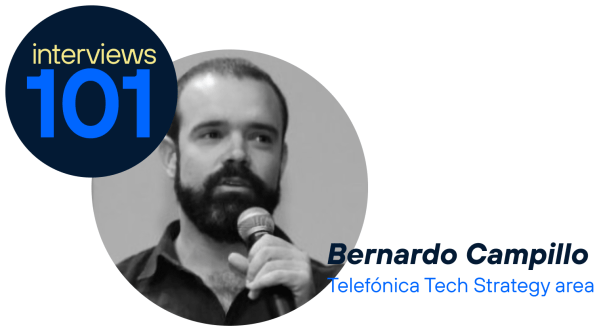Tell us a little about yourself. What does your job at Telefónica involve?
I have spent almost my entire professional life dedicated to the cybersecurity business and today I am dedicated to the development of cybersecurity business for large companies, which very briefly consists of sitting down with the CISOs (Chief Information Security Officers) of large corporations to understand their risks and concerns, and helping them to develop their entire cybersecurity strategy hand in hand with the services we offer at Telefónica Tech.
In addition, I have another role which consists of developing a culture of totalisation at Telefónica Tech, creating a strategy where we are capable of commercialising our verticals of IOT, AI, data, cybersecurity and cloud in a way that maximises the adoption of our services by our customers.
How has cybersecurity evolved since you started working in this area?
We say that Telefónica has been in the cybersecurity market for 15 years, I’ve been here for 14… so I’ve seen the growth of this business up close and the truth is that it’s been incredible.
When I arrived in this world, we only marketed perimeter security, physically attached to the IT infrastructures of our clients, and from there we have moved on to not having perimeters, to protecting networks, ‘the clouds’, identities or raising awareness among employees, and now we are immersed in protecting everything related to artificial intelligence or being allies of quantum computing.
Cybersecurity is a fascinating world that is constantly evolving at a dizzying pace.
How has the perception of the importance of cybersecurity for society in general and for companies in particular changed in recent years?
We have gone from being a necessary evil to being a trending topic practically every day.
Society in general has evolved: it must have an antivirus, be aware that its data is very valuable and unfortunately the increase in phishing scams, etc. has made people start to worry about their personal data or to be on the lookout for possible cyber-scams.
In the business world, cybersecurity has become a strategic priority. In terms of regulation, we have also stepped up our efforts at the Spanish and European level so that increasing investment in technology, good practices and team training is no longer an option. Any company with a minimum level of digitisation must always be aware of the risks it is taking and how it is protecting itself.
In your opinion, are people sufficiently aware of cybersecurity?
Unfortunately, generally speaking, no. We are capable of quickly integrating technology into our lives (you only have to look at the use of ChatGPT, which is constantly increasing) but we are not aware of the risks involved.
Because of my ‘professional bias’ I often try to raise awareness among those close to me and I still face comments like ‘how exaggerated’ when I give advice. I think we should be much more aware of the precautionary principle.
On a different note, from your personal experience, and as an engineer, how do you think the percentage of women in STEM careers could be increased?
Visibility, visibility and visibility. The more the work we STEM women do is seen and the more the wide spectrum of scientific professions that exist, at all levels, goes viral, the more girls will learn to see this world as an achievable, interesting, creative and challenging opportunity.
How important is it to have female role models in the fields of science and technology?
In my opinion, it is very important, not only because it inspires girls and young women, but also because it is necessary to challenge gender stereotypes and promote equal opportunities.
Science is there to provide answers to the world’s problems and the presence of more and more women in science encourages a more inclusive approach to tackling these problems. We all have a lot to contribute from our gender perspective and this diversity in teams is necessary to improve creativity and decision-making, which will also benefit both industry and society in general.
Despite how society has evolved, is there still a perception that the world of technology is more masculine than feminine?
I think we still have a long way to go to change this perception and it has a lot to do with what we generally know about this world. We all know the name of a CEO of a technology company, but could we name a woman? They exist, of course, but few people could name one.
But it’s not all bad news. I think that society as a whole agrees that a more inclusive world is a fairer world, and we are on the right track.
Who do you know at Telefónica that you would nominate for this interview that you consider excellent in their work?
A great woman and STEM professional, Ester Bermejo Izquierdo.












